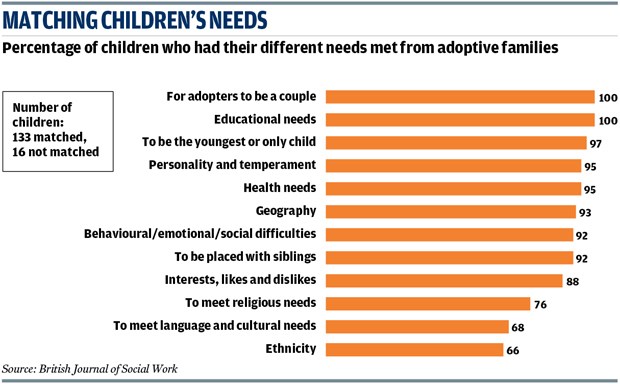Family Finding and Matching in Adoption: What Helps Make a Good Match?
Charlotte Goddard
Monday, May 25, 2015
Authors Elaine Farmer and Cherilyn Dance, University of Bristol and University of Bedfordshire
Published by British Journal of Social Work, February 2015

SUMMARY
Matching a child to an adoptive family able to meet their needs is key to ensuring a successful placement but too much emphasis on a "perfect match" can lead to harmful delays. Professor Elaine Farmer and Dr Cherilyn Dance wanted to compare the effectiveness of different approaches to family finding and matching in the UK.
For their study - Family Finding and Matching in Adoption: What Helps to Make a Good Match? - the researchers surveyed 74 local authorities and 16 voluntary adoption agencies in England and Wales. They found attitudes to matching varied widely and so did practice. For 37 per cent of adoption managers placing a child with a family of the same ethnicity was an absolute priority, while two thirds said they would seek a placement that was not ethnically matched if a "same race" placement was not found within a reasonable period. Two thirds of adoption managers also thought the criteria for finding a family should be reconsidered if a child had been waiting more than six months but 34 per cent said they would wait for longer.
The team then analysed data from a sample of 82 children already placed in families, and 67 cases which they were able to follow from the point of an official adoption recommendation to the first six months of placement. The children were from 10 local authorities. Thirty-one per cent were from a minority ethnic background, 25 per cent had a disability or health problem with seven per cent classed severe, 18 per cent had delayed development and more than a third were to be placed with siblings.
Forty per cent of the children's placements were continuing and positive after the first six months, 27 per cent were positive but had encountered some problems, and 18 per cent had significant problems but these did not pose a threat to stability. Meanwhile five per cent of placements were at risk of disruption and five per cent had broken down. The researchers judged 73 per cent of the placements were good matches, 14 per cent were fair matches involving some compromise which was outweighed by other positive factors, and 13 per cent were poor, and involved serious compromise either when it came to the requirements of the child or the preferences of the adopters.
Almost two thirds - 63 per cent - of the poor matches resulted in disruption of placements or placements where stability was threatened while the same was true for only five per cent of good or fair matches. Only 31 per cent of poor matches were rated as a positive experience for the child compared with 93 per cent of good or fair matches.
Some of requirements for a child's adoptive family were more easily met than others. All children who needed their adopters to be a couple were matched with a couple. However ethnicity requirements were matched in only 66 per cent of cases. Significantly more compromises were made to match children with moderate or highly complex needs.
When it came to choosing a family, the final decision was made in a formal meeting (62 per cent), informal meeting (15 per cent) or by individual social workers (23 per cent). In all but one of the disrupted placements the decision had been taken informally. There were significantly more poor-quality in-house matches - 33 per cent - compared with inter-agency ones at 18 per cent.
IMPLICATIONS FOR PRACTICE
It is important that information about a child is regularly updated and the children's difficulties are not minimised, as accurate information is a prerequisite for successful matching, the researchers conclude. The requirements for a child's family need to be as broad as possible and reviewed as early as possible if a family is not found. Better matches are found when a case is transferred early to adoption teams while sharing information in matching meetings also appears to lead to better matches.
FURTHER READING
- Linking and Matching: A Survey of Adoption Agency Practice in England and Wales, Cherilyn Dance, Danielle Ouwejan, Jennifer Beecham and Elaine Farmer, British Association for Adoption and Fostering (BAAF), 2010. A snapshot of current linking and matching practice, revealing varying costs and outcomes for children, innovative practice and diametrically opposed views about this subject amongst practitioners.
- Rethinking Matching in Adoptions from Care: A Conceptual and Research Review, David Quinton, BAAF, 2012. A review of research and current models.
- Are We Missing the Match? Rethinking Adopter Assessment and Child Profiling, Jennifer Cousins, Adoption & Fostering, December 2003. An argument for a new approach that avoids hypothetical "matching" categories and is led by the needs of the child.




